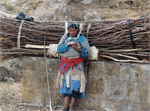Published on Fri, 2014-07-18 09:44
Many voices have recently alerted to the impacts of the rulings by the US courts on Argentina’s ongoing dispute with a small minority of its creditors. Far from staying confined to Argentina, the decisions will have negative consequences on global financial stability have warned the International Monetary Fund, countries such as France, Mexico, Brazil and the US State Department, as well as economic analysts and civil society organizations. In a recent statement human rights organizations are now calling on governments to consider the worldwide human rights impacts of this decision. |
Published on Fri, 2014-07-18 09:18
Development aid is being redefined. Before the new UN Development Goals (Post-2015 Agenda) can be determined, the industrialized countries of the OECD wish to redefine which financial flows count as development aid. The Development Assistance Committee (DAC) of the OECD has been measuring financial flows from its members to developing countries since the 1960s. The data, compiled every year, provides information about which donor country invests how much in which developing country and in what development sector. In essence, all grants (see glossary below) and concessional loans that go towards the economic and social development are recognized as Official Development Assistance (ODA). In 1970, the United Nations General Assembly agreed for the first time that industrialized countries would earmark 0.7% of their annual gross national income as ODA. This goal has been repeatedly reaffirmed, but so far has been attained by just five of the 28 DAC donor countries (Denmark, Luxembourg, Norway, Sweden and the United Kingdom). |
Published on Tue, 2014-07-15 10:19
The United Nations is on the verge of releasing a new set of Sustainable Development Goals (SDGs) – perhaps 17 or more – to replace the eight Millennium Development Goals (MDGs) which will run out by the end of 2015. The proposed new SDGs, which will make amends for the shortcomings of the MDGs, will be an integral part of the U.N.’s post-2015 development agenda which, among other things, seeks to eradicate extreme poverty and hunger from the face of the earth by 2030. |
Published on Sat, 2014-07-12 00:00
Silence about the painful developments in Gaza is not acceptable anymore. The daily violations of international law and human rights and the dangerous escalation that has been taking place during the last three days in the Strip qualify as war crimes and crimes against humanity, even genocide. Since the hostile military operations against the Gaza Strip were launched; that is, for the last three days, more than 100 Palestinian martyrs have fallen and more than 700 others were wounded, in addition to the comprehensive destruction of properties and infrastructures. Israel ignores all international standards applicable in armed conflicts by directly targeting civilians, implementing collective punishment by imposing economic siege, and banning the entry of medical and relief materials. Also, the Israeli military machine, which is threatening a land aggression, does not take into any consideration the principle of proportionality and to eschew collateral damage. |
Published on Fri, 2014-07-11 12:09
During the last meeting of Heads of State and Government of Brazil, Russia, India, China and South Africa (BRICS Summit), held in Durban, South Africa, in 2013, BRICS’ leaders announced the decision to establish, already in 2014, the BRICS Development Bank. For the next BRICS summit, to take place in the city of Fortaleza, Brazil, on July 14, 15 and 16, they announced signing of a formal agreement on this Bank, but there are still a lot of expectations and doubts about the basis on which it will be constituted. |
SUSCRIBE TO OUR NEWSLETTER






